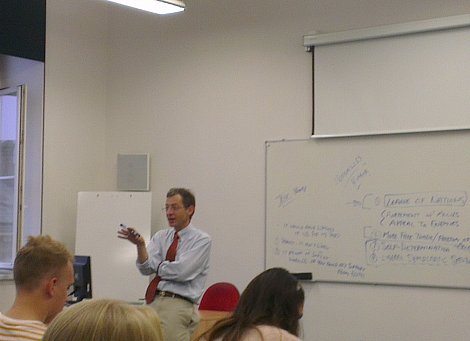The class, consisting of daily lectures during the course of one week, is part of the Department of International Relations and European Studies and an outcome of a longer collaboration between the two universities. The lecture I attended on Wednesday – which was on USA foreign policy during and after World War I – was fueled by student input, lively class discussions and the enthusiastic mood of Professor Rhodes.
After the lecture I had the opportunity to ask him some questions. “I am greatly enjoying teaching the course so far and I am impressed by the level of knowledge and preparation the students are showing, also in the undergraduate course I taught this morning,” he answered on how the lectures were going.
“For me as a scholar of American foreign policy it is very insightful to have an exchange with people who see my discipline from an entirely different perspective,” he described.
According to him students at Masaryk University have a much more critical stance towards Nationalism and are generally more skeptical on the legitimacy of American foreign policy than his students at George Mason University.
Challenging stereotypes and new ways of thinking
To my question why he thought it is valuable for students to follow his course, he mentioned that for the students here it could be fruitful to challenge stereotypes they might have of Americans and their view on their own country's foreign policy, next to the value of becoming acquainted with an insider's perspective on American foreign policy.
Rhodes mentioned how he hopes to create an exchange of visions through the discussion he initiates in his lectures, enabling different viewpoints and new ways of thinking on international relations. He also expressed how happy he was to be here in Brno for a week. “I came here with my wife and 9 year old son, it is a shame we cannot stay longer, as we are all really enjoying it here, but of course my son needs to get back to school and my wife back to work next week.”
The course is part of a longer cooperation between George Mason University and Masaryk, that thus far mostly consisted out of an exchange of lecturers. Rhodes expressed his hope for continuation of these relations and intensifying of the cooperation, mentioning the possibility of a future exchange of students between the two institutions as well.
It was clear from first encounter that the professor greatly enjoyed teaching the class, and many students actively involved in the discussion showed that he was not alone in this. The course created room for a dialogue between people from different backgrounds resulting in an exchange of visions, valuable for the students as well as for the teacher.
blog comments powered by Disqus